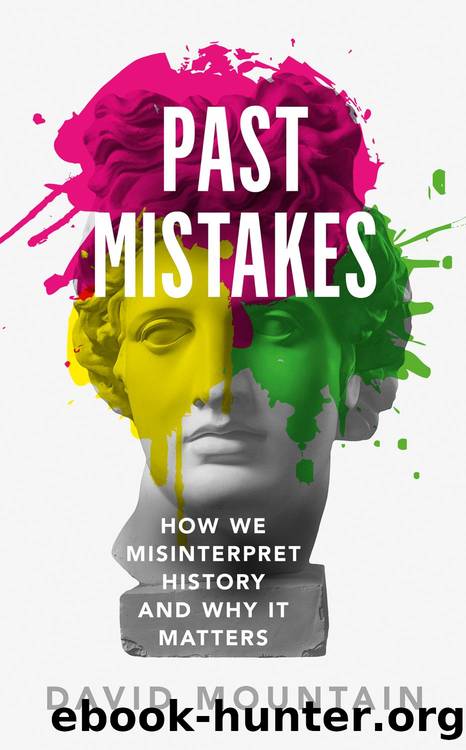Past Mistakes by David Mountain

Author:David Mountain
Language: eng
Format: epub
Publisher: Icon Books Ltd
Published: 2020-11-15T00:00:00+00:00
As Columbus grew in popularity, however, so too did his critics. In 1874 the American diplomat Aaron Goodrich published his scathing History of the Character and Achievements of the So-Called Christopher Columbus, denouncing the Columbus legend as âbut a gilded lie ⦠full of rottenness and dead menâs bonesâ.49 In his wake there followed a series of critical â if more measured â assessments from professional historians. In 1891 Justin Winsor, librarian of Harvard University, unapologetically described Columbus as a man of âoverwhelming selfishnessâ with âno pity for the misery of othersâ, whose colonisation of Hispaniola left a âlegacy of devastation and crimeâ.50
Other critics seemed more upset by Columbusâ newfound status as a champion of immigrants and Catholics. âGodâs plan was that Protestantism and not Catholicism should have its chance in the New World,â fumed one historian.51 Proof of Godâs plan was therefore quickly sought, and the late 19th century saw strenuous efforts to credit the discovery of America to a more suitably Protestant explorer. Detractors gleefully pointed to the Norse, whose ancient sagas described a series of expeditions to lands west of Greenland sometime around the year 1000 CE. True, the Norse werenât Protestants (many werenât even Christians 1,000 years ago), but they were suitably Anglo-Saxon enough to satisfy the anti-Catholic brigade. A full five centuries before Columbus, the sagas claimed, the explorer Leif Erikson set sail after hearing rumours of thickly wooded lands to the west â an enticing prospect for someone living on treeless Greenland, where timber was constantly in short supply. Living up to his nickname âLeif the Luckyâ, he found not one but three lands: the barren Helluland, the wooded Markland and the fertile Vinland. A subsequent expedition returned a few years later with the aim of creating a permanent settlement in Vinland, but severe winters and clashes with the natives eventually put an end to such ambitions.52
It was an exciting story, and not beyond the realms of possibility: the Norse were accomplished sailors, they were familiar with the North Atlantic, and Greenland was closer to mainland North America than Europe. The only trouble was in substantiating the claim. The sagas were too vague, too unreliable to be considered proof. They contradicted each other in places. Believable accounts of exploration were intermingled with clear strains of fantasy. Moreover, hard evidence was conspicuously absent. No shortage of purportedly âVikingâ discoveries had begun cropping up all across north-east USA, but none passed muster with professional archaeologists, who found them all to be either hoaxes or misidentifications. For some, this lack of evidence wasnât a problem: in 1887 the amateur historian Marie Brown argued that the Catholic Church, âthe foulest tyrant the world has ever hadâ, had for centuries deliberately suppressed any evidence of the Norse discovery of America as part of its merciless quest for world domination.53
The difficulty in evidencing the Norse discovery of America did nothing to discourage similar efforts, and there soon began a veritable industry in âprovingâ that Columbus wasnât the first person to discover America.
Download
This site does not store any files on its server. We only index and link to content provided by other sites. Please contact the content providers to delete copyright contents if any and email us, we'll remove relevant links or contents immediately.
| Africa | Americas |
| Arctic & Antarctica | Asia |
| Australia & Oceania | Europe |
| Middle East | Russia |
| United States | World |
| Ancient Civilizations | Military |
| Historical Study & Educational Resources |
The Dawn of Everything by David Graeber & David Wengrow(1707)
The Bomber Mafia by Malcolm Gladwell(1625)
Facing the Mountain by Daniel James Brown(1553)
Submerged Prehistory by Benjamin Jonathan; & Clive Bonsall & Catriona Pickard & Anders Fischer(1455)
Wandering in Strange Lands by Morgan Jerkins(1430)
Tip Top by Bill James(1416)
Driving While Brown: Sheriff Joe Arpaio Versus the Latino Resistance by Terry Greene Sterling & Jude Joffe-Block(1376)
Red Roulette : An Insider's Story of Wealth, Power, Corruption, and Vengeance in Today's China (9781982156176) by Shum Desmond(1359)
Evil Geniuses: The Unmaking of America: A Recent History by Kurt Andersen(1354)
The Way of Fire and Ice: The Living Tradition of Norse Paganism by Ryan Smith(1336)
American Kompromat by Craig Unger(1315)
F*cking History by The Captain(1304)
It Was All a Lie by Stuart Stevens;(1300)
American Dreams by Unknown(1286)
Treasure Islands: Tax Havens and the Men who Stole the World by Nicholas Shaxson(1274)
Evil Geniuses by Kurt Andersen(1257)
White House Inc. by Dan Alexander(1212)
The First Conspiracy by Brad Meltzer & Josh Mensch(1174)
The Fifteen Biggest Lies about the Economy: And Everything Else the Right Doesn't Want You to Know about Taxes, Jobs, and Corporate America by Joshua Holland(1126)
